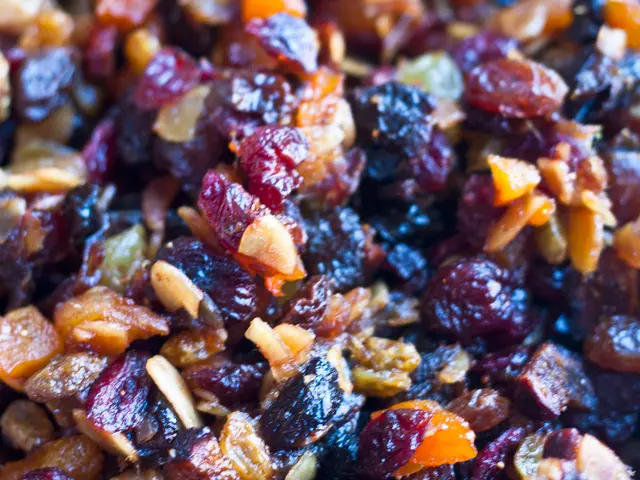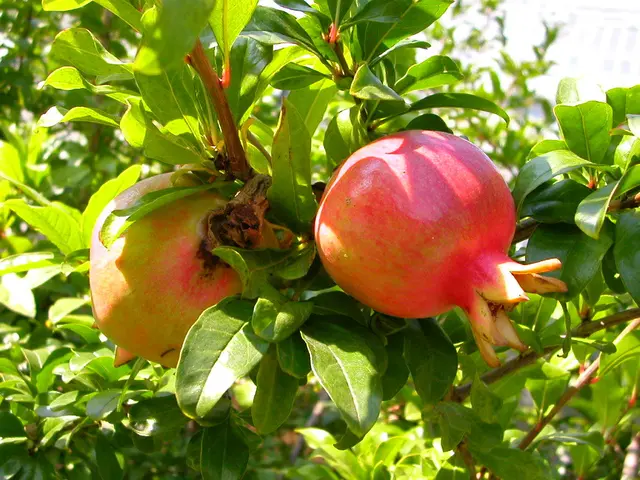Daily consumption of beans could potentially reduce cholesterol levels, thereby enhancing heart health.
READY TO DIG INTO SOME BEANS?
Latest research reveals that adding chickpeas and black beans to your diet could significantly improve your health if you've got prediabetes.
In a 12-week study, scientists found that swapping white rice for these tasty legumes results in lower inflammation markers and better cholesterol levels. And guess what? The findings were shared at the annual NUTRITION 2025 meeting by the American Society for Nutrition.
So, what exactly did the study say?
The researchers compared the effects of white rice, chickpeas, and black beans on prediabetic participants for 12 weeks. They measured parameters like high-density lipoprotein (HDL) cholesterol, low-density lipoprotein (LDL) cholesterol, C-reactive protein, Interleukin-6 (IL-6), plus glucose metabolism and blood glucose levels.
At the end of the study, the participants who chowed down on chickpeas saw a drop in their total cholesterol, while those who went for black beans had reduced inflammation markers (IL-6). No notable changes in glucose metabolism were found, though.
Surprisingly, the white rice group also experienced lower LDL "bad" cholesterol levels by the study's end.
Since it was a smaller-scale study that didn't last long, more research is needed to fully understand the potential benefits. But one thing's for sure, black beans and chickpeas are inexpensive, healthy options that are worth exploring further if you've got prediabetes.
What's Prediabetes Anyway?
Prediabetes is a condition that affects around one-third of Americans. It's characterized by higher-than-normal blood glucose levels but not high enough to be diagnosed as type 2 diabetes. Unlike type 2 diabetes, prediabetes can be reversed - that's why scientists are investigating interventions that could help.
Nutrition plays a key part in type 2 diabetes development, so many scientists are focusing on dietary interventions, like consuming legumes.
Investigating Inflammation and Legumes
The researchers in this study recruited 72 prediabetic participants and wanted to see how black beans and chickpeas, consumed daily, might impact health after six and 12 weeks.
By the end of the 12-week mark, those participating in the study showed reduced inflammation markers and improved cholesterol levels. The scientists plan to dive deeper into the connection between metabolic health and the gut microbiome in the future.
The Health Perks of Beans
Chickpeas and black beans belong to the legume family, which also includes peas, lentils, pinto beans, kidney beans, and lima beans. Not only are they rich in protein and fiber, but they've been linked to a lowered risk of cardiovascular disease and even cancer[1].
Soluble fiber, which is found in high levels in legumes, can help reduce cholesterol and prevent inflammation [2].
How to Get More Beans in Your Life
Despite being widely available and cheap, many Americans aren't incorporating enough legumes into their diets. But here's the good news: it's easy to add beans to your meals without breaking the bank.
Blend them into soups, top your salads with them, or pair them with grains like rice or quinoa. They can also replace red and processed meats in dishes like curries, stews, and casseroles. If you've got irritable bowel syndrome, it's important to gradually increase your intake and consult a dietitian for managing symptoms effectively.
In the end? Eat more beans. Your body - and your wallet - will thank you.
References:
[1] "https://pubmed.ncbi.nlm.nih.gov/22421487/" (accessed April 18, 2023)
[2] "https://www.ncbi.nlm.nih.gov/pmc/articles/PMC2794619/" (accessed April 18, 2023)
[3] "https://pubmed.ncbi.nlm.nih.gov/27602870/" (accessed April 18, 2023)
[4] "https://academic.oup.com/ajcn/article/88/6/1616/5086544" (accessed April 18, 2023)
[5] "https://pubmed.ncbi.nlm.nih.gov/32532569/" (accessed April 18, 2023)
- Incorporating chickpeas and black beans into your diet could greatly enhance your health if you have prediabetes, as recent studies suggest.
- The health benefits of these legumes extend beyond prediabetes, as they have been linked to a reduced risk of chronic diseases such as cardiovascular disease and even cancer.
- These nutritious foods are a cost-effective option, making them an attractive choice for managing health and preventing disease.
- Nutrition, particularly the consumption of legumes like chickpeas and black beans, plays a crucial role in the development of type 2 diabetes.
- Other nutrition interventions, like dietary changes, are under investigation as a means of reversing prediabetes and possibly preventing type 2 diabetes.
- Science continues to reveal the potential health advantages of consuming legumes, with recent research exploring their impact on inflammation markers, cholesterol levels, and cardiovascular health.
- Despite being widespread and budget-friendly, many people neglect to include sufficient legumes in their diets.
- To boost your bean intake, consider using them in soups, salads, grain dishes, or as meat alternatives in recipes like curries, stews, and casseroles.
- For those with medical conditions such as irritable bowel syndrome (IBS), it's essential to take a gradual approach and consult a dietitian to manage symptoms effectively.
- A healthy and balanced lifestyle, which includes a nutritious diet, regular exercise, and proper medical care, can significantly improve overall health and wellness.
- As global cuisines continue to evolve and diversify, healthy cooking techniques and recipes featuring legumes are increasingly popular, offering opportunities to expand your palate while keeping your heart, and wallet, happy.








